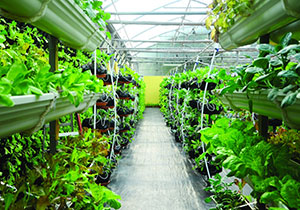It is not traditional anymore, everything is moving at an accelerating pace, it is the year 2070, when Emirati farms are teeming with robots, with the early morning, self-driving cars begin plowing the earth, driven by robots, followed by drones all the time, spraying seeds and giving them a report Detailed about the condition of the soil and moisture, directing it in a smart way, until the harvest begins, so that another car powered by solar energy carries out the picking process, and selects the ripe fruits, excluding those that have not yet ripened, then sends detailed reports on the condition of the fruits, and in the event of an agricultural pest, they identify and deal with it ; Detailed information is sent to the digital control room that is the mastermind of the farm, generates the necessary statistics, as well as the presence of robot workers, virtual non-physical fence, digital fields, robotic control room, and more.

A hypothetical image and a forward-looking view monitored by "Al-Bayan", inspired by the national endeavors on the future of agriculture, and sustainable efforts that push agriculture and food security towards different future paths, to place the UAE in the ranks of the global countries that rely on the triad of automation, innovative solutions and agricultural research for food sustainability.
In a related context, research and investigation about new solutions and advanced studies related to the agricultural sector have become an imperative and a vital focus for which strategies are formulated, as it is an essential tributary to food security, which would stimulate endeavors and calls to encourage scientific agricultural research.
This is the approach that the UAE government and all the authorities responsible for agriculture in the country have followed, including the Abu Dhabi Agriculture and Food Safety Authority, which adopts a development policy based on directing investment in the agricultural, food and technological sectors. The agricultural sector in Abu Dhabi has become contributing to more than 40 different local agricultural products. .
partnerships
And because the cross-fertilization of global ideas is of great importance in reaching the sustainable goals set by the authority, many international partnerships and memoranda of understanding that support the food security system have been established, with many research centers, universities and the private sector at the international, regional and local levels, which serve to achieve the vision and goals of the authority in The areas of agricultural sustainability and food and biosecurity, the most important of which are an agreement in the field of agriculture and modern agricultural techniques with the Rural Development Institute (RDI) in the Republic of South Korea, an agreement for a sustainable agricultural development plan with the Food and Agriculture Organization of the United Nations (FAO), agreements with the World Organization for Animal Health (OIE), and an agreement with the Center International Biosaline Agriculture Dubai ICBA.
the nerve of food
Agricultural technology has become the alphabet of companies looking for fresh investment and sustainable food, in preparation for a developed agricultural future in the UAE.
Jinan Investment Company confirmed that attention to the four aspects of irrigation, technical equipment, continuous development and supply chain facilities, constitute a solid basis for supporting national agriculture and foreign investments today and in the future, and the company focuses on supporting these aspects with continuous research and development, which contributed to being a key player in the process of achieving The national agenda and the promotion of food security, which made the company at the forefront of investment companies in the field of agriculture and food production in the UAE and the region.
Irrigation "subsurface"
In 5 continents around the world, the farms owned by Al Dahra Agricultural Company are spread, as the company has started in the United States of America, specifically the state of Arizona, to use subsurface irrigation systems, and these systems are known for their great efficiency to save water and their contribution to sustainability, in order to reduce the quantities used of fertilizers and pesticides to To a very large extent and to preserve the plant and its continuity for the largest possible period.
Also in Romania, Al Dahra uses the largest and most powerful corn and wheat harvesters.
Agriculture automation
Of course, the outlook for the future of agriculture in the UAE is based on the possibilities of high standards and the cross-fertilization of sustainable ideas at the global and regional levels, and was predicted by many global reports that discussed the technical future of agriculture in the Middle East. The National Farmers Report and the Future of Food in 2040 report, to monitor international trends on the future of technical agriculture, where Graham stressed that it is important to think seriously about how to increase productivity and reduce the impact on the environment, as there are technologies under development that will take care of crops and every cultivation or control of pasture Livestock without a physical fence, and by 2040 this technology will be common in the field of agriculture, and the second step is that the agricultural sector must become more efficient to reduce the volume of greenhouse gas emissions, as the agricultural sector plays a prominent role in increasing these gases globally.
Graham said: "Over the next 20 years, we will face potential changes arising from earthquakes, in addition to the increase in the world's population and the need to limit climate change in thinking about sustainable technical solutions, including vertical farming and emerging crops, as the introduction of vertical agriculture and recent developments that will occur in the The technology of using artificial lighting in agriculture (LED lighting), to expand the range of crops that can be grown using hydroponics, aquatic diets, and other controlled ecosystems.